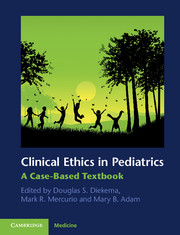Book contents
- Frontmatter
- Contents
- Contributors
- Preface
- Section 1 Core issues in clinical pediatric ethics
- Section 2 Ethical issues at the beginning of life: perinatology and neonatology
- Section 3 When a child dies: ethical issues at the end of life
- Section 4 Ethical issues posed by advances in medical technology and science
- 25 Minors as recipients and donors in solid organ transplantation
- 26 Enhancement technologies and children
- 27 Cochlear implants and deaf children
- 28 Ethical issues in the treatment of pediatric patients with disorders of sex development
- 29 Sterilizing procedures in minors with cognitive disabilities
- 30 Parental requests for intervention in children with lethal conditions
- 31 Genetic testing and screening of minors
- 32 The introduction of innovative technology into practice
- 33 Human subjects research involving children
- Section 5 Children, public health, and justice
- Section 6 Special topics in pediatric ethics
- Index
- References
30 - Parental requests for intervention in children with lethal conditions
from Section 4 - Ethical issues posed by advances in medical technology and science
Published online by Cambridge University Press: 07 October 2011
- Frontmatter
- Contents
- Contributors
- Preface
- Section 1 Core issues in clinical pediatric ethics
- Section 2 Ethical issues at the beginning of life: perinatology and neonatology
- Section 3 When a child dies: ethical issues at the end of life
- Section 4 Ethical issues posed by advances in medical technology and science
- 25 Minors as recipients and donors in solid organ transplantation
- 26 Enhancement technologies and children
- 27 Cochlear implants and deaf children
- 28 Ethical issues in the treatment of pediatric patients with disorders of sex development
- 29 Sterilizing procedures in minors with cognitive disabilities
- 30 Parental requests for intervention in children with lethal conditions
- 31 Genetic testing and screening of minors
- 32 The introduction of innovative technology into practice
- 33 Human subjects research involving children
- Section 5 Children, public health, and justice
- Section 6 Special topics in pediatric ethics
- Index
- References
Summary
Case narrative
Annie is born at full term with good Apgar scores, but weighs only 2350 grams. On physical exam, she is alert but has somewhat low tone. She has abnormal facial features, a short sternum, and over-riding digits. After failure to pass a nasogastric tube, a tracheal–esophageal fistula (TEF) is diagnosed. Chromosome studies confirm trisomy 18, and an echocardiogram shows a moderate ventricular septal defect (VSD) and moderate pulmonary valvular dysplasia.
Ellen, the neonatologist, and Mary, the surgeon, meet Annie’s parents, Bill and Liz, to discuss treatment options. They explain that trisomy 18 is a lethal condition and that most children die within the first few weeks to months. The team does not recommend surgery, explaining that surgery is not in the child’s best interest and will result in unnecessary suffering for Annie. They offer the services of the neonatal palliative care team and reassure Bill and Liz that the palliative care team can assist the family in the grieving process. They can provide comfort care for Annie by keeping an IV in place for hydration and pain relief.
- Type
- Chapter
- Information
- Clinical Ethics in PediatricsA Case-Based Textbook, pp. 174 - 180Publisher: Cambridge University PressPrint publication year: 2011
References
- 1
- Cited by

